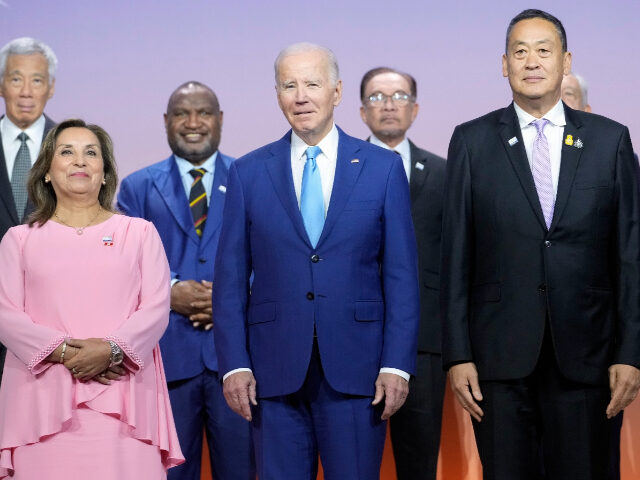Thirteen leaders of Asia-Pacific Economic Cooperation (APEC) nations joined President Joe Biden to sign a “regional trade framework” on Thursday.
Biden claimed the agreement was a major accomplishment even though it is non-binding and missing key elements of the Indo-Pacific Economic Framework (IPEF), an agreement the administration hoped to sign at the APEC summit after years of negotiations.
The other signatories included Australia, Brunei, Fiji, India, Indonesia, Japan, Malaysia, New Zealand, the Philippines, Singapore, South Korea, Thailand, and Vietnam.
“We still have more work to do, but we’ve made substantial progress. In record time, we’ve reached consensus on three of the pillars of the IPEF,” Biden said at the APEC summit on Thursday.
APEC’s joint statement on the agreement promised to:
…[P]romote workers’ rights, increase our capacity to prevent and respond to supply chain disruptions, strengthen our collaboration on the transition to clean economies, and combat corruption and improve the efficiency of tax administration.
The joint statement hailed the supply chain portion of the agreement as “the first of its kind” and said it would be supplemented by a “critical minerals dialogue” to “foster closer collaboration on strengthening IPEF critical mineral supply chains and boosting regional economic competitiveness.”
Biden also touted the supply chain agreement as crucial in his remarks, saying it would “help identify supply chain bottlenecks before they become the kind of disruptions we saw during the Covid-19 pandemic.”
Although Biden never really circled back to the point in his speech, the missing “fourth pillar” of the IPEF would be its fair trade provisions. Voice of America News (VOA) quoted critics who said the missing market access provisions were at least as important as what the agreement signed on Thursday actually contained:
“For a country like us, we have to have at least market access,” Indonesian CEO Anindya Bakrie told VOA on the sidelines of the summit.
Joshua Kurlantzick, a senior fellow for Southeast Asia at the Council on Foreign Relations, said most Southeast Asian states are “tepid” about the deal.
The bottom line, he said, is, “It’s not a trade deal, and the U.S. is not offering any market access in IPEF. And the Southeast Asian states can contrast that with actual trade deals that have been passed in Asia over the last seven years, including major, major trade deals that involve China, South Korea, Japan, and other big economies, as well as ASEAN [Association of Southeast Asian Nations] being in the middle of that.”
Kurlantzick said the APEC nations went along with the flawed agreement on Thursday to avoid antagonizing the Biden administration because “they’re cordial, and they do want a greater U.S. security presence.”
The South China Morning Post (SCMP) said on Friday:
The lack of an IPEF trade agreement is a setback for the Biden administration. It had aimed to showcase the initiative during the APEC summit as a symbol of its economic re-engagement in Asia, providing countries a counterweight to China’s growing trade and economic clout in the region.
Russian state media hooted that the APEC conference was a bust, unable to reach a comprehensive trade agreement because the meeting was “stymied by geopolitics.”
“I don’t want to reveal all the subtleties of the quiet diplomacy that is going on there right now. But the disputes, of course, are mainly centered on geopolitical issues,” Russian Deputy Foreign Minister Alexander Pankin told the Tass news service in an interview on Thursday.
Pankin went on to strongly hint that some APEC nations were balking at the Biden administration’s demands to take a stronger stand against Russia’s invasion of Ukraine. He noted some of the leaders gathered in San Francisco also have valuable trade relationships with Russia, which they should not discard lightly.
We appeal to reason with our partners, who should understand that APEC as a forum is wonderful because it is about a depoliticized dialogue on specific things, which these discussions have confirmed: dialogue with business, participation of international economic organizations and business associations, which bring news from the ground and a reality check to the conversation between ministers.
More optimistic analysts said Thursday’s agreement might have been largely symbolic, and the full IPEF remains elusive, but at least the APEC nations are talking and laying the groundwork for future progress.
Reuters thought the U.S. could be making some progress in selling itself to Asian powers as a trading alternative to China, whose economy is faltering. Most of the APEC leaders and many private business leaders hope the relationship between the U.S. and China will stabilize for the benefit of the global economy.

COMMENTS
Please let us know if you're having issues with commenting.